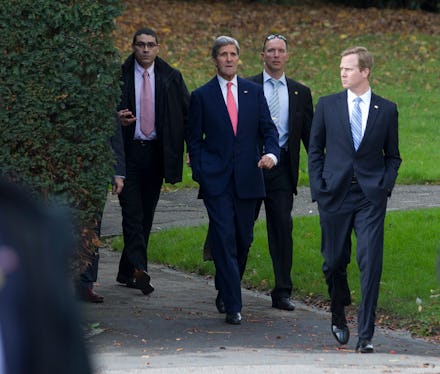Iran Nuclear Talks: How a Deal Could Ruin U.S. Allegiances in the Middle East

Recent U.S. policy in Syria and Egypt has alienated some of America’s most vital allies in the Middle East. Secretary John Kerry flew to Geneva this week to hammer out the final details of a deal with Iran on its nuclear program. The deal, which eases U.S. sanctions without extracting meaningful concessions from Iran, will deepen the rift between the U.S., Israel, and Saudi Arabia. It also fails to mitigate the threat of a nuclear armed Iran.
President Obama and his administration have many tools with which reduce the pressure of sanctions on Iran without the approval of congress or even the international community. The president can, for example, modulate how strongly he enforces sanctions on Iran’s financial sector.
The U.S. first implemented financial sanctions in 2010 in an effort to starve Iran’s nuclear program of funding. Iran has become adept at getting around these sanctions by creating foreign entities that act as money laundering fronts. The Treasury Department constantly updates the list of entities which launder money for the Iranian regime and enforces sanctions against them.
Prior to the Iranian presidential election, there was a rapid increase in the number of these entities identified by the Treasury Department — The Obama administration was putting pressure on Iran. After the election of the supposedly moderate President Hassan Rouhani, there has been a lull in the same. While the administration insists that it has not lifted sanctions in any way, it’s clear that President Obama was telling Iran that negotiation is a possibility.
The White House believes that sanctions have worked to some extent. A spokesman for the Treasury told The Daily Beast that, "the significant financial pressure on Iran in recent years changed the calculus of the country’s leaders and led to the election of President Rouhani, who is a former nuclear negotiator and is considered more moderate than his predecessor." The administration is hoping President Rouhani — a man described by Israeli Prime Minister Benjamin Netanyahu as a "wolf in sheep’s clothing" — will cooperate in finding a diplomatic solution to the crisis.
The Geneva agreement is, admittedly, just a first step. However, it could prove a crucial mistake if it undermines what has thus far been accomplished through sanctions or undermines the faith U.S. allies in the region have in a diplomatic solution.
From what we know about the deal so far, the U.S. will agree to partially ease some sanctions in exchange for a halt in the most advanced parts of Iran’s uranium enrichment program. The problem with this deal is that it doesn’t affect Iran’s enrichment capability. Iran has not agreed, to dismantle enrichment facilities, destroy centrifuges, or reverse any of the uranium enrichment it has already done.
The U.S. is giving Iran’s economy a break — paradoxically just as the administration claims that sanctions were having their desired effect — and is getting nothing substantive in exchange. In fact, Iran has promised that it will never give up the right to enrich uranium. If Iran has learned anything from North Korea, it knows that it could merely threaten to resume enrichment in order to extract further concessions. Of course, the U.S. could respond by increasing pressure on the country , but Iran’s economy would already have recovered somewhat. The cycle could go on forever, just as it has in North Korea, until Iran has enough enriched uranium to make a bomb.
In the meantime, détente with Iran will weaken U.S. standing with its allies. After a visit by Secretary Kerry, Netanyahu vociferously denounced the deal and reasserted that "Israel is not obliged by this agreement," implying that Israel still reserved the right to conduct unilateral air strikes against Iranian facilities. He also clearly stated that other U.S. allies in the region were deeply concerned about the deal, even if they didn’t say so publicly. As if to prove this point, Saudi Arabia quietly moved to acquire nuclear weapons of its own from Pakistan last week.
Unlike the United States, Saudi Arabia and Israel would face an existential threat from a nuclear Iran. They are concerned that the U.S. is abandoning them in exchange for meaningless concessions from Iran. Currently, Iran is powerful regional player , but its influence is, to some extent, containable. If it were to acquire nuclear weapons, however, its neighbors would have little power to stop Iran from achieving its ambitions. Regardless of the content of the current agreement, the damage to U.S. standing with its allies will have a significant impact on regional stability in the long term.